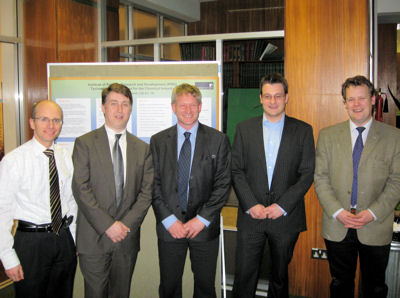News
Three Technology Strategy Board projects
Process Integration and Product Enhancement Through Crystal Growth Modifiers. The project will deliver new experimental and modelling capability for the discovery and characterisation of molecules able to modify the crystal growth of industrial compounds. Crystallisation is the most important means of purifying high value chemical products and then delivering them into forms that can be efficiently formulated. Partners: Syngenta Ltd (lead), AstraZeneca plc, Pfizer Limited, Institute of Process Research and Development - University of Leeds, Avantium Pharma B.V.
Step-change, high-purity manufacture of high-value pharmaceutical, fine chemical and biotechnology products. Cp-Star - Tethered Catalysts. The project will immobilise homogenous metal catalysts to inert supports, which will enable more efficient processing through flow reactions and prevention of product contamination. Homogenous catalysts are used widely to produce pharmaceuticals but are notoriously difficult to separate from the product. Partners Reaxa Ltd (lead), AstraZeneca plc, Pfizer Limited, Institute of Process Research and Development - University of Leeds, Cambridge University.
Extraction, isolation and application of natural polyphenols, polysaccharides and pigments from British seaweeds for highvalue applications-Seaweed3P. The overall objective is to develop a comprehensive range of hair colorants, hair care agents, and skin care agents derived from seaweed with a whole life cycle of sustainable technology from source, through production, to end use and appropriate disposal. Partners, Bod Ayre Products Ltd (lead), Critical Processes Ltd, The Body Shop, Independent Cosmetic Advice Ltd, Higgins' Consultancy Ltd, Institute of Process Research and Development - University of Leeds
Organic Chemistry
Symposium
24 March 2009 - Symposium "Recent Challenges in Crystallisation Science and Engineering" (PDF)
Transformation funding
The award of a £1.8M grant by the University of Leeds features in the Issue 534 of the Reporter
iPRD Launch

The RSC Symposium ‘Towards Environmentally Benign Chemical Processes’ on Friday 14th March 2008 marked the formal launch of the Institute of Process Research and Development (iPRD), and the associated MSc course in Chemical Process Research and Development. It was preceded by the inaugural meeting of the iPRD Industrial Club.
The first speaker was Prof. Matthias Beller, University of Rostock who spoke about 'Molecular-defined Catalysts for the Synthesis of Fine and Bulk Chemicals'. Prof. Jonathan Williams from the University of Bath then gave a lecture on 'Borrowing Hydrogen in the formation of C-C and C-N bonds'. In keeping with the industrial emphasis of the iPRD, Dr Cameron Cowden of Merck Process Research UK, then gave an account of the Efficient Synthesis of a Merck Drug Candidate.
The Plenary speaker of the event was Prof. Paul T. Anastas of Yale University, USA who gave a thought provoking talk on 'Green Chemistry: Origins, Current Status and Future Directions'. Professor Anastas (pictured above) was the recipient of the RSC John Jeyes Award for his work on Chemistry in Relation to the Environment, and was presented with his medal at the symposium.
Pictured right to left: Prof. Chris Rayner (iPRD), Prof. Paul Anastas (Yale University), Dr John Blacker (iPRD Director), Dr Richard Blackburn (iPRD), Dr Patrick McGowan (iPRD).
